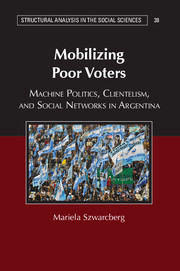Book contents
- Frontmatter
- Dedication
- Contents
- Acknowledgments
- 1 Mobilizing Poor Voters
- 2 The Microfoundations of Political Clientelism
- 3 Building a Party Network: Political, Partisan, and Social Networks in Argentina
- 4 Moral Hazard and Asymmetric Information Networks
- 5 The Logic of Perverse Incentives
- 6 Scaling Up: The Logic of Perverse Incentives at the Subnational Level
- 7 Mobilizing Poor Voters: A Comparative Perspective
- 8 Conclusions: Winners Lose
- Notes
- References
- Index
7 - Mobilizing Poor Voters: A Comparative Perspective
Published online by Cambridge University Press: 05 November 2015
- Frontmatter
- Dedication
- Contents
- Acknowledgments
- 1 Mobilizing Poor Voters
- 2 The Microfoundations of Political Clientelism
- 3 Building a Party Network: Political, Partisan, and Social Networks in Argentina
- 4 Moral Hazard and Asymmetric Information Networks
- 5 The Logic of Perverse Incentives
- 6 Scaling Up: The Logic of Perverse Incentives at the Subnational Level
- 7 Mobilizing Poor Voters: A Comparative Perspective
- 8 Conclusions: Winners Lose
- Notes
- References
- Index
Summary
More than forty years ago, James Scott identified poverty as “perhaps the most fundamental quality shared by the mass clientele of machines” (1969: 1150). As poverty persists in many developed and developing countries, clientelistic candidates who can solve poor voters’ problems are likely to succeed in gaining their political support. Hence, most of the descriptive and analytical findings presented in this book should apply to many developing and developed countries that experience poverty. Specifically, I expect to find similar unintended consequences from the logic of perverse incentives in countries, regions, provinces, states, and neighborhoods where candidates have the capacities and preferences to use clientelistic strategies to mobilize poor voters, and where using these strategies enables – or at least does not inhibit – the candidates’ political promotions.
The practice of paying poor voters to show support at party rallies is not unique to the Argentine case. In both Mexico and Peru, clientelistic strategies are so commonplace that unique vocabulary has emerged to describe its participants. In Peru, voters who are paid in exchange for turning out at rallies receive the creative and descriptive name of the portable people (portátiles), and in Mexico they are referred as the hauled people (acarreados). This chapter studies strategies of political mobilization in Peru and Mexico to examine the scope conditions of the theory advanced in this book. Additionally, this chapter seeks to illustrate how the logic of perverse incentives could be effectively used to explain the consolidation of clientelism and its unintended consequences in other new democracies.
In contrast to Argentina, Peru is a democracy without parties (Levitsky and Cameron 2003; Tanaka 2005) and a “party non-system” (Sánchez 2009). Partisan networks that can target and deliver particularistic goods to voters in exchange for their support and that can monitor their political behavior do not exist in Peru. As such, studying the case of Peru enables me to provide further support for the logic of perverse incentives in a context that lacks the institutionalized political parties and partisan networks found in Argentina.
I did field research in Lima spanning six months before, during, and after the presidential election of 2006. I conducted more than 40 in-depth interviews with party candidates, operatives, mayors, councilors, and political brokers.
- Type
- Chapter
- Information
- Mobilizing Poor VotersMachine Politics, Clientelism, and Social Networks in Argentina, pp. 129 - 139Publisher: Cambridge University PressPrint publication year: 2015

